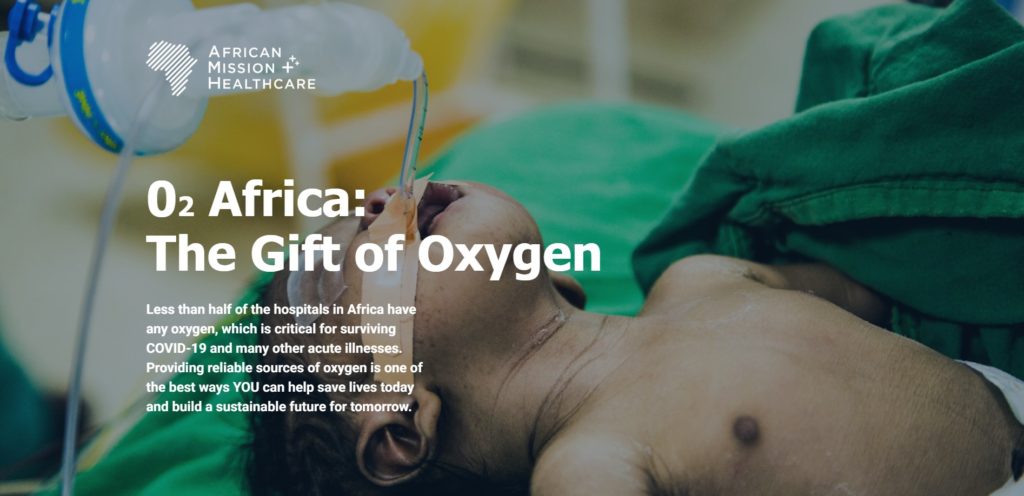DELAND, FL — African Mission Healthcare (AMH) has announced its O2Africa campaign to raise $1 million to make oxygen sustainably available to care for COVID-19 and other acutely ill patients in sub-Saharan Africa. AMH will immediately invest $360,000 made possible by the generosity of co-founder Mark Gerson and his wife Rabbi Erica Gerson, who are challenging others to join them in raising $1 million to save lives and build sustainable oxygen sources.
“Oxygen is the most high-impact intervention in the history of medicine,” Makary said. “It is, by far, the most important single resource a hospital can offer its patients — and the single most needed life-saving therapy for hospitals. Thanks to this initiative from African Mission Healthcare, hundreds of thousands of African patients — from mothers in delivery to children with pneumonia and adults with COVID — will gain access to this life-saving medical necessity, and be able to live where they otherwise would not.”
Oxygen is listed by the World Health Organization as an “essential medicine,” yet remains one of the least available worldwide, especially in developing nations.
AMH’s first project is planned for Maua Methodist Hospital in central Kenya. Maua is a 100-bed referral hospital that provides essential care for a community of more than 600,000 people. The new system will more than triple the hospital’s current life-saving oxygen capacity and over its life, will enable Maua to care for more than 80,000 patients for an average cost of only $6.
“The cost of life-saving oxygen is almost all in building and maintaining the infrastructure, as the primary raw material is air,” observed Mark Gerson. “That means the ROI of building oxygen capacity — even including the necessary equipment — is astonishingly high. Building oxygen capacity at hospitals like Maua will save COVID patients and the lives of many other people suffering from acute illnesses. Building these oxygen plants will help save lives today and well into the future.”
Dr. Jon Fielder, CEO and co-founder of AMH, is currently experiencing the impacts of the pandemic firsthand as a member of the AIC Kijabe Hospital’s COVID clinical response team in Kijabe, Kenya. Dr. Fielder has served as a missionary doctor in Africa since 2002 and observes, “There are patients throughout Africa whose lives are at risk and too often are lost because hospitals either do not have enough or do not have any oxygen. In fact, fewer than half of African hospitals have any oxygen — and if the denominator included smaller health facilities, that number would be less than 20%. And even fewer have the kind of high-flow, high-volume oxygen required by COVID patients.”
“Closing this ‘oxygen gap’ presents a real challenge,” Dr. Fielder continued. “In AMH’s experience, the best solutions involve forging context-appropriate responses with the right partners. In this case, we need to develop solutions that give patients near and long-term access to life-saving oxygen at well-functioning hospitals.”
For many of AMH’s mission hospital partners, the addition or expansion of oxygen generation plants to produce and distribute oxygen supplies is the best answer. While extremely cost-effective, these projects are well beyond the hospital’s means, costing between $150-250K. The projects are also complex, requiring specialized skills and planning. In order to save as many lives as possible, AMH has set out to start building these projects now.
Given the urgency posed by the COVID-19 pandemic, AMH will begin the first project immediately using the funds generously provided by the Gersons. If successful in raising a total of $1 million, AMH plans to install large oxygen plants at four of its mission hospital partners. The plans also include equipping two hospitals with the capacity to store and share excess oxygen production to benefit surrounding hospitals and save more patients.
More information about the O2Africa campaign is available here.
African Mission Healthcare (AMH) strategically partners with Christian mission hospitals to support and propel their enduring commitment to provide quality, compassionate care for the hurting and forgotten and to nurture an improving health system in sub-Saharan Africa.
Founded in 2010, AMH has invested $26.5 million in 47 partners in 18 countries, enabling 600,000 direct patient visits and 18,600 surgeries and has sponsored 275 degree-level students in the health professions. AMH operates the largest HIV clinical training program in Kenya, has renovated operating theaters in Uganda, deployed X-ray equipment to multiple countries, constructed new facilities in Kenya, staff and trainee housing in Malawi, and solar power installations in Burundi.
Website | africanmissionhealthcare.org Twitter | @AfricaMHF
Podcast | @AfricaMHF
Mark Gerson is an entrepreneur and philanthropist who (along with wife, Rabbi Erica Gerson) is perhaps the world’s largest individual supporter of Christian medical missions. He is the co-founder of African Mission Healthcare and co-founder and Chair of United Hatzalah of Israel, the crowd-sourced volunteer system of rapid first responders. He is the author of a forthcoming book on the Haggadah entitled, “The Telling: How Judaism’s Essential Book Reveals the Meaning of Life.”
Website | therabbishusband.com Twitter | @markgerson
Podcast | The Rabbi’s Husband
Read more news on Health Issues, Africa, and the COVID 19 Pandemic.
GFA’s Statement About Coronavirus
Sources:
- The Kairos Company, African Mission Healthcare launches ‘O2Africa’ campaign to provide $1M for critically needed oxygen to treat COVID-19 and other acutely ill patients in sub-Saharan Africa
- African Mission Healthcare, Official Website
